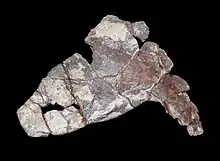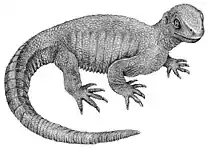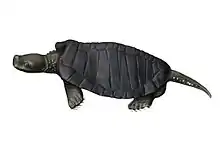Kallokibotion
Kallokibotion is an extinct genus of stem-turtle from the Upper Cretaceous (Maastrichtian, 86–66 million years ago), known from fossils found in Romania. One species is known, Kallokibotion bajazidi, which was named by Franz Nopcsa after his lover Bajazid Doda.[1][2] It literally means 'beautiful box of Bajazid'; Nopcsa chose the name because, in the words of British palaeontologist Gareth Dyke, "the shape of the shell reminded him of Bajazid's arse".[2] A second undescribed species is known from the Santonian of Hungary.[3] A fossil of this turtle was mistakenly described as a pterosaur of the genus Thalassodromeus in 2014.[4] It was originally identified as a Meiolaniid. However, phylogenetic analysis based on characters described from new specimens place Kallokibotion as the sister taxon of the crown Testudines.[5]
| Kallokibotion | |
|---|---|
 | |
| Fossil carapace, Deva Natural History Museum | |
| Scientific classification | |
| Kingdom: | Animalia |
| Phylum: | Chordata |
| Class: | Reptilia |
| Clade: | Perichelydia |
| Family: | †Kallokibotiidae |
| Genus: | †Kallokibotion Nopsca, 1923 |
| Species: | †K. bajazidi |
| Binomial name | |
| †Kallokibotion bajazidi Nopsca, 1923 | |
| Synonyms | |
| |
References
- Gaffney, Eugene S.; Meylan, Peter A. "The Transylvanian turtle, Kallokibotion, a primitive cryptodire of Cretaceous Age". American Museum Novitates (3040). hdl:2246/5005.
- Pickrell, John (2017-03-28). Weird Dinosaurs: The Strange New Fossils Challenging Everything We Thought We Knew. Columbia University Press. ISBN 9780231543392.
- Botfalvai, Gábor; Ősi, Attila; Mindszenty, Andrea (2015). "Taphonomic and paleoecologic investigations of the Late Cretaceous (Santonian) Iharkút vertebrate assemblage (Bakony Mts, Northwestern Hungary)" (PDF). Palaeogeography, Palaeoclimatology, Palaeoecology. 417: 379–405. doi:10.1016/j.palaeo.2014.09.032. ISSN 0031-0182.
- Dyke, G. J.; Vremir, M.; Brusatte, S.; Bever, G.; Buffetaut, E.; Chapman, S.; Csiki-Sava, Z.; Kellner, A. W. A.; Martin, E.; Naish, D.; Norell, M; Ősi, A.; Pinheiro, F. L.; Prondvai, E.; Rabi, M.; Rodrigues, T.; Steel, L.; Tong, H.; Vila Nova, B. C.; Witton, M. (2014). "Thalassodromeus sebesensis—a new name for an old turtle. Comment on 'Thalassodromeus sebesensis, an out of place and out of time Gondwanan tapejarid pterosaur', Grellet-Tinner and Codrea" (PDF). Gondwana Research. 27 (4): 1680–1682. doi:10.1016/j.gr.2014.08.004.
- Adán Pérez-García; Vlad Codrea (2018). "New insights on the anatomy and systematics of Kallokibotion Nopcsa, 1923, the enigmatic uppermost Cretaceous basal turtle (stem Testudines) from Transylvania". Zoological Journal of the Linnean Society. 182 (2): 419–443. doi:10.1093/zoolinnean/zlx037.


